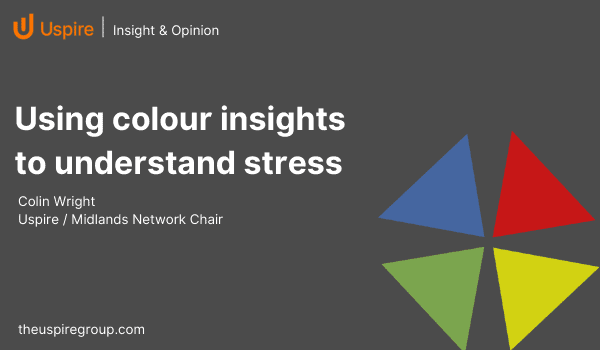Recently we held one of our first Uspire Online Discovery Days and people were able to experience the benefit of colour insights.
As we explored the behaviours of different colour styles under stressful conditions it became apparent that this level of stress for executives in the current environment of crisis management could be a norm and therefore quite challenging for a leader and the team dynamic.
Yellow energy people become manic, impatient, irritable and demanding.
Green become silent, judgemental, impersonal, stubborn and over cautious.
Blue exhibit questioning, deliberate nit picking, aloofness, and become withdrawn and resentful.
Red signals are aggression, impatience, irritability and becoming demanding.
So if highly stressful conditions have escalated and the teams behaviour starts to resemble the pattern above what can you do?
My advice is to encourage people to take more time before responding to questions and you as the leader or meeting facilitator need to own this discipline and create that environment.
Include this in your meeting behaviours or rules of engagement upfront and use the following science to explain.
It was Dr Viktor Frankl who wrote the book “Man’s search for meaning” he and his wife had been held in Nazi concentration camps including Auschwitz, an environment of overwhelming stress and uncertainty. He found the one area that he had total control of under these conditions was the gap between stimulus and response.
“Between stimulus and response there is a space. In that space is our power to choose our response. In our response lies our growth and our freedom.”
In essence our auto response system needs to be controlled because responding to stimuli with resentment, aggression, impatience, criticism, stubbornness, avoidance and indecision will not help the situation. Our developed brain enables us to pause before responding and this is a fundamental part of what makes us human.
We have five unique human capabilities that need to be put to use in this space:-
1. Mindfulness - our ability to guide our emotions and engage our brains with appropriate focus before deciding on actions.
2. Vision - the ability to see other possibilities, create different solutions and concepts to solve a situation.
3. Conscience - the way we determine right from wrong and where we store our personal values this adds to our capability to make a good rather than bad decision.
4. Strength of character - our true self the embedded motivational triggers that enable us to determine the appropriate choices.
5. Self-awareness - our ability to take a third dimensional view of ourselves and have the realisation of the environment we are in and the individually unique powerful influence that our decisions can make if we do not exhibit respectful control.
How can you improve these qualities in yourself and others? Here are a few tips to consider.
Mindfulness in the work environment
1. Encourage people to pause before answering. Get them to write thoughts down ahead of giving a reply.
2. Make sure people are in the room and focused on the topic. Avoid distractions.
3. Declutter your meeting rooms
4. Be patient. Don’t rush peoples thought processes issue the questions or required outcomes ahead of a meeting.
5. Be relaxed when you get into the room. Go for a break or walk five to ten minutes before the meeting.
Vision and imagination
1. Ask the right challenging questions
2. Tell relevant stories
3. Anchor expert opinion
4. Broaden the perspective and move outside the boundaries
5. Create a quantity rota (the number of ideas on the table before narrowing down the options)
Conscience
1. Revisit the company values
2. Give each option a people impact score
3. Lead and facilitate with empathy
4. Deal with the truths, be honest build trust.
5. React quickly to any sense of injustice.
Strength of character
1. Exhibit and practise self control
2. Encourage and promote contentment
3. Use a mentor or coach for support and ask them to become your external “accountability partner”
4. Document and list the teams and your successes
5. Develop personal brand statements....the who you are and who you want to become.
Self-awareness
1. Explore and participate in self-development workshops
2. Get to understand your emotional kryptonite
3. Ask for feedback and spend a few minutes at the end of the meeting to ask how people felt it went and did everyone say what they needed?
4. Understand your personal value set and any cognitive distortions (mental habits that hinder us)
5. Monitor your self-talk and say no or stop to negative thoughts.
Chaired by Colin Wright, Chairman and NED for several successful businesses, the Uspire Midlands POD brings business coaching in the Midlands to a collection of high potential commercial leaders and SME owners who benefit hugely from the 1-2-1 mentoring and peer based learning workshops. Visit the Midlands Network POD page for more information or contact Colin for a confidential discussion about how The Network can help you and your business.

